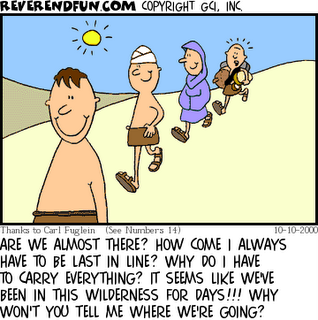Sometimes it is helpful—even essential—to complain.
More commonly, our complaints are not really about what they
purport to be, but are, instead, symptoms of a poor attitude in need of
adjustment.
Ecclesiastes famously teaches that there is a time and season
for everything. So it goes with
complaining. If no one complained about
unjust, inequitable, and intolerable situations, nothing would change for the
better. We need whistle-blowers and
activists—justified complainers—to speak out against the unacceptable status
quo. Thus, early in the Torah’s exodus
narrative, the Israelites complain about a real lack of food and water, and God
responds respectfully, providing them with what they need.
However, most of the time our complaining is merely the
outward expression of our own inner negativity. In such cases, our whining is not
ameliorated when we get what we supposedly want, for we will always find a new
excuse to keep up the kvetching. There
is no limit to the potential objects of discontent for fundamentally
dissatisfied people.
Such is the nature of the complaining in this week’s
portion, Beha’alotecha. The Israelites carp at Moses: “Who will
feed us meat?” Yet, as Rashi notes in
his commentary, they actually have plenty of meat to eat. Torah tells us that when we left Egypt, “A
great multitude went up with them, and also flocks and cattle.” Forty years later, as we prepare to enter the
land of Israel, Torah again points out, “The children of Reuben had much
cattle.” In other words, the Israelites
had no shortage of steak. As God and
Moses both recognize, their craving and complaining is not really about the
meat. It is, instead, a reflection of
the Israelites’ own failure of faith and imagination.
This week, every time you are tempted to complain about
something, consider your motivation. Are
you questioning the status quo in order to change it for the better? Or are you just giving voice to your own,
deeper discontent? If you can honestly
affirm the former, then speak (and act) up!
If not, then reflect on ways to shift your attitude.

